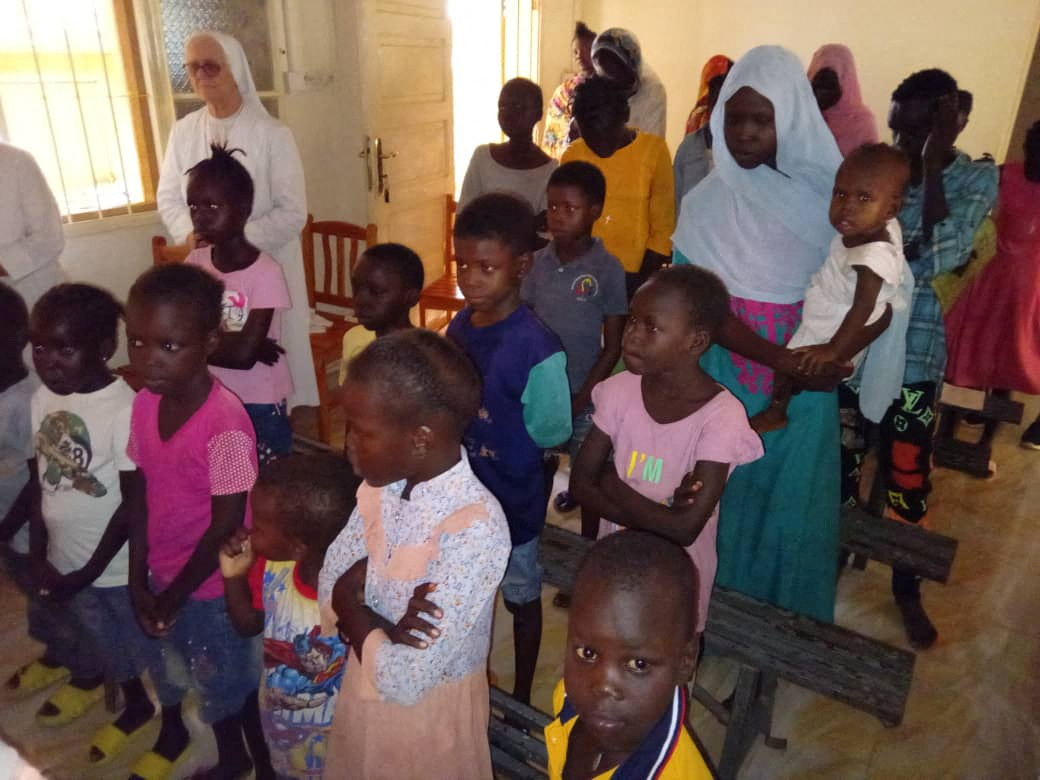
Women and children are starving and bombarded while confined to a church in the capital of Sudan
With food supplies running low and his own weight increasing, Father Jacob Thelekkadan, trapped in a Catholic mission sheltering scores of women and children from the fighting raging on the streets of Khartoum, punched new holes in his belt.
According to the priest and seven other mission personnel, about 80 people are seeking safety inside the Dar Mariam mission, a Catholic church and school complex in Khartoum’s al-Shajara district, after becoming caught in the crossfire between Sudan’s army and the paramilitary Rapid Support Forces (RSF).
Parts of the nuns’ lodgings have been set on fire, and shells have damaged the main building’s roof. The walls of the mission are riddled with holes from errant bullets.
Due to the scarcity of food, many adults have skipped meals and the nuns have been boiling tree leaves for the kids to eat.
Three members of the charity’s staff were among the seven injured and two killed from a Red Cross attempt to rescue them in December. The convoy was forced to turn back before it could complete the operation due to gunmen opening fire on it. Both parties exchanged accusations on the attack.
According to Thelekkadan, he and the nuns turned down proposals from the army to permanently cross the river and leave the people behind.
Thelekkadan, a 69-year-old Indian national, declared, “We will be the first to leave, but with the people, when the road is safe.”
When the fighting broke out in April of last year, it swiftly extended throughout the country, engulfing Khartoum as well as its sister cities, Omdurman and Bahri, which are located along the Nile. Many people who lived in the capital of Sudan fled.
The RSF stationed snipers atop tall buildings while seizing control of residential areas and important locations in Khartoum at the outset of the conflict. In the absence of viable ground forces, the army retaliated with airstrikes and heavy artillery.
For individuals without the means to escape or nowhere else to go, the Dar Mariam mission developed into a safe haven.
Images that Thelekkadan shared with Reuters depict rooms and hallways that have been blackened by smoke, walls that have been severely damaged by gunfire, and portions of the mission’s structures covered in debris.
Thelekkadan stated, “Our food situation became very bad.” “We’re all very weak.”
Famine warnings have been issued for portions of Sudan, including Khartoum, as a result of extreme hunger spreading throughout the worst-affected areas of the country.
TEN MILLION UPDATED
In June of last year, a few families sought refuge at the mission in the hopes that its concrete roof would provide safety. However, the area was quickly blocked off as the RSF advanced to seize the important Armoured Corps camp, which was one of several military locations it was pursuing and was located approximately 2 km away, according to Thelekkadan.
The district of Al-Shajara has been heavily targeted by the RSF. Some of the locals who have the means to do so have been waiting for months to be ferried over the Nile since they registered with the military.
However, Thelekkadan stated that it is thought to be too dangerous for the mission’s youngsters to evacuate by boat across the White Nile at night.
According to the International Organization for Migration, the conflict in Sudan has resulted in the largest internal displacement crisis in history, forcing up to 10 million people to look for safety either within or outside of their nation.
According to Reuters, the battle has caused ethnically motivated deaths in Darfur’s western region and spread lethal hunger.
The capital, which was spared from the earlier battles in modern-day Sudan, has also seen unparalleled devastation as a result of the war. Aid workers claim that because both fighting factions have made it difficult to give humanitarian support, citizens are now dependent on philanthropy from organizations like neighborhood volunteer groups.
According to a representative of RSF media, the army had obstructed the attempt by the paramilitary to permit the International Committee of the Red Cross (ICRC) to evacuate the families and was instead using them as human shields.
According to an army spokeswoman, the families had been forced into hiding by the war, and soldiers from the Armored Corps had done their job by assisting and shielding them, as had been the case in other regions where the army had been involved in conflicts.
Although exact numbers have changed, Thelekkadan reports that since March, roughly 30 women and 50 kids between the ages of 2 and 15 have resided at the mission. Two nuns, an army intelligence officer in charge of Khartoum’s churches, four women seeking refuge at the mission, an administrator, and two additional priests who have maintained contact with Dar Mariam all affirmed his story.
The majority of those residing at the mission are Christian refugees from Ethiopia and South Sudan, who have erected tents constructed of plastic sheeting around the compound’s structures, which include a house, a school, and a church.
They flee inside the house when fighting breaks out nearby. A few impoverished Muslim families from Sudan have also temporarily sought refuge at the mission.
AWARENESS DURING EVACUATION
The assaults in November destroyed a statue of the Virgin Mary at the compound’s entry, tore through the main building’s second story, and ignited the roof. Numerous individuals sustained minor injuries.
The Dar Mariam entrance was in the sights of RSF snipers. According to Thelekkadan, a neighborhood youngster was killed when sniper fire caused a piece of mortar shrapnel to sever his head. The boy had assisted in creating an escape route at the rear of the property.
According to sister Miriam, a nun, the mission’s occupants have been battling “a lot of shooting and bombing,” as she revealed to Reuters via video chat.
We have adapted to it and no longer feel fearful. We are waiting for evacuation, but God is keeping us safe,” she remarked.
To try to shield the kids from the gunfire, Thelekkadan and the nuns converted their safest room into a shelter. They encouraged the kids to play computer games and set up a place for them to ride bicycles in the yard in an effort to divert their attention from the bloodshed going on all around them.
Thelekkadan remarked, “We tried not to make them feel like they are in a prison.”
Early in January, the mission was once more caught in the crossfire, and the nuns’ residence’s rooms were set on fire.
Food has proven to be difficult. By September, money was getting tight, and fighting made it almost impossible to get goods from nearby marketplaces.
The kids have frequently been given little portions of beans, lentils, and cereal. But the supply ran out.
According to Thelekkadan, since February, supplies for Dar Mariam have been airdropped by troops stationed at the Armored Corps camp. These supplies include gasoline for generators that are used to extract water from wells and sugar.
In order to facilitate phone use, the army also supplied a Starlink connection to personnel present at the mission. Twice they took off with the priest and an administrator to visit church authorities and pick up some supplies and money in Port Sudan, a Red Sea city where army and government headquarters have moved.
Another nun, Sister Celestine, said she still gets scared whenever the region is shaken by bombs.
Her words, “I would like to be out of here,” “I want to get out and write a book about everything that happened.”
There’s been no indication that the combat will stop.
“These past four days have become very trying for all of us in Dar Mariam and people around as explosions, bombings, gunfire etc have become more intense and frequent!” June 19, Thelekkadan stated in a message. “Please do continue to pray for us.”
All Categories
Recent Posts
Tags
+13162306000
zoneyetu@yahoo.com



